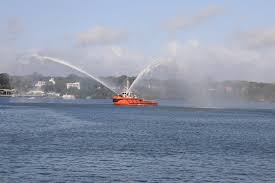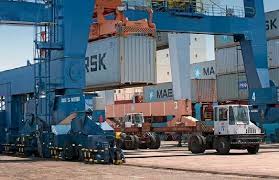IMPA Foundation: From Sea to Port for a Resilient Maritime Workforce

Stealth frigate warship. (Photo/ Courtesy)
By Andrew Mwangura
Email, thecoastnewspaper@gmail.com
In an era where global trade hinges on the seamless operation of maritime routes, the establishment of the IMPA Foundation represents a beacon of proactive leadership in an industry often overshadowed by logistical challenges and workforce shortages. Founded by the International Maritime Pilots’ Association (IMPA), this charitable entity, registered as a Charitable Incorporated Organisation (CIO) under the foundation model, aims to fortify the maritime sector by nurturing a resilient workforce through targeted scholarships. With its mission to advance education for young individuals pursuing careers at sea and ashore—particularly those from underrepresented groups—the foundation addresses a critical gap in an industry that safeguards 90% of world trade yet struggles with talent attraction and diversity.
As we reflect on its blueprint and proposed board of trustees, it’s clear that this initiative not only promises immediate support but also lays the groundwork for a more inclusive and sustainable maritime future.
The foundation’s origins trace back to a meticulously planned roadmap, with milestones set from late 2024 through 2025. By incorporating as a CIO under the Charity Act 2011 and registering solely with the Charity Commission, IMPA has chosen a structure that balances simplicity with robust protections—offering separate legal personality and limited liability for trustees while avoiding the dual oversight burdens of a charitable company.
This choice, favored by 70% of corporate foundations in the UK, underscores a pragmatic approach to governance, ensuring the organisation can focus on impact rather than administrative hurdles.
The governing document, the IMPA Foundation Constitution, enshrines a clear objective: providing financial aid for tuition, materials, and training to build human expertise in safeguarding global trade.
The vision extends further, envisioning a global maritime community where diverse talents thrive, contributing to safer, more secure shipping industries. In a world grappling with automation and environmental pressures, this emphasis on human-centered development is refreshingly forward-thinking, recognizing that no algorithm can replace the nuanced judgment of skilled pilots navigating treacherous waters.
Central to the foundation’s potential success is its proposed board of trustees, a lineup of industry heavyweights whose expertise could propel its ambitions.
Leading the charge is Captain Simon Pelletier, IMPA’s president since 2014 and a veteran marine pilot on Canada’s St. Lawrence River with over four decades of seafaring experience.
His re-elections in 2018 and 2022 highlight his global influence, representing pilots from over 50 countries and advocating for safety standards that prevent disasters.
As chair, Pelletier’s hands-on knowledge ensures the foundation remains grounded in practical realities. Joining him is Guy Platten, the outgoing Secretary General of the International Chamber of Shipping (ICS), who steps down in 2025 after steering the organisation through pivotal issues like decarbonization and crew welfare.
With a 30-year career spanning sea and shore roles, including boosting membership at the UK Chamber of Shipping, Platten brings strategic acumen and a proven track record in policy advocacy, vital for fundraising and stakeholder engagement.
Ambassador Nancy Karigithu adds an invaluable international dimension, drawing from her three decades in Kenya’s maritime sector. As Advisor on Blue Economy to the President of Kenya and former Principal Secretary for Shipping, she has championed sustainable ocean policies, chaired the IMO’s Technical Cooperation Committee, and even vied for the IMO Secretary-General position.
Her focus on opening opportunities for women and underrepresented groups aligns perfectly with the foundation’s ethos, potentially bridging gaps in developing regions where maritime talent is abundant but under-resourced.

The proposed inclusion of Ms. Vicky Maki Honda, Program Director at The Nippon Foundation’s Ocean Affairs Department, would have further enriched this board. A Japanese-Canadian with expertise in international ocean initiatives, Honda’s work on projects like Seabed 2030 demonstrates her prowess in funding marine education and research.
Though she appears absent from the current trustee list—perhaps due to scheduling conflicts or strategic adjustments—her initial nomination signals IMPA’s intent to tap into philanthropic networks like the Nippon Foundation, known for investing millions in global maritime resilience.
Financially, the foundation starts on solid footing, with IMPA as the primary donor injecting initial capital for operations, reviewed at the November 2024 Executive Committee meeting.
Ongoing annual funding commitments ensure sustainability, but the real ingenuity lies in diversified fundraising mechanisms: ambassadors, partnerships, networking and charity events, IMPA conferences, and online platforms.
This multifaceted approach, coupled with stakeholder engagement targeting donors like shipping companies, pilots’ associations, and service providers, alongside promoters such as media, NGOs, educational institutions, and legislators, positions the foundation to amplify its reach.
External communication strategies—leveraging the IMPA website, social media, and an inspirational tone through educational content, impactful stories, and calls to action—will build brand awareness, fostering a narrative of hope and urgency in an industry facing crew shortages and aging workforces.
Grants criteria emphasize IMPA scholarships and funding for training programs approved by respective maritime authorities, ensuring accountability and relevance.
While the long-term plan includes a SWOT analysis to identify strengths like IMPA’s global network, opportunities in emerging markets, weaknesses in initial funding dependencies, and threats from economic volatility, the foundation’s trajectory—from incorporation in Q4 2024 to the first scholarship grant in Q2 2025 and assessment in Q3—suggests a commitment to adaptive growth.
By August 2025, with the first grants likely disbursed, we can anticipate tangible outcomes: young cadets from diverse backgrounds equipped to become the next generation of pilots, engineers, and shore-based experts.
The importance of the IMPA Foundation extends significantly to Kenyan seafarers, cadets, and maritime education and training institutions.
For Kenyan seafarers, the foundation offers a lifeline by providing scholarships that cover tuition, course materials, and training expenses, addressing financial barriers that often hinder career progression in an industry where opportunities can be scarce.With Ambassador Nancy Karigithu’s influence, the foundation is poised to prioritize underrepresented groups, including Kenyan women and youth, fostering inclusivity and boosting the local maritime workforce’s resilience.
Cadets benefit from targeted financial support and mentorship, enabling them to pursue careers both at sea and ashore, aligning with the foundation’s mission to build a skilled international workforce.
This is particularly vital in Kenya, where the maritime sector is growing, yet access to quality training remains limited.
Maritime education and training institutions, such as the JKUAT ,Technical University of Mombasa, Bandari Maritime Academy and affiliated academies, stand to gain through funding for approved programs, enhancing their capacity to produce competent professionals.
This collaboration could elevate Kenya’s maritime education standards, positioning the country as a regional leader and supporting the blue economy’s sustainable development.
In my view, the IMPA Foundation is a timely and essential intervention, countering the maritime sector’s talent crisis amid geopolitical tensions and climate challenges.
By prioritizing underrepresented groups, it not only enhances diversity—crucial for innovation—but also upholds safety standards that prevent economic disruptions.
The board’s caliber, blending operational grit with policy foresight, inspires confidence, though expanding it to include more voices from Asia or Africa could broaden its global appeal.

Ultimately, this foundation embodies the maritime ethos of navigation through uncertainty: steady, collaborative, and visionary.
If executed with the same rigor as its planning, it could transform lives and secure the arteries of global commerce for generations, with a profound impact on Kenya’s maritime community.
The industry, and indeed the world, stands to gain immensely from its success.
The author is a policy analyst specializing in maritime governance and blue economy development.






